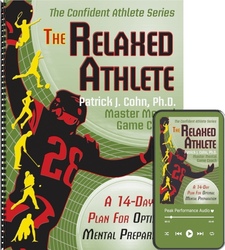
What do you do after you finish a season where you fell short?
Do you try to forget the season and put it out of your mind?
Each year, athletes and teams set their sights on an end-of-the-year target.
However, not all athletic goals are achieved. Things don’t always go as planned. Adversity strikes. Circumstances change.
After an unfulfilled season, many athletes are left to feel they are not talented or don’t have what it takes to succeed.
Without an objective, end-of-the-year evaluation, you will haphazardly proceed to the following season without understanding what happened or what needs to change to achieve your future goals.
The first step towards a successful season is to process the previous season and the circumstances that contributed to falling short of your goals:
- Was the goal realistic? In other words, was the goal achievable relative to the length of the season?
- Were there circumstances beyond your control, such as injury or illness, that affected your ability to train?
- What can you do differently in the upcoming season? What skills do you need to develop? Did your mental game help or hinder your performance?
- What role did your effort and focus play in your level of performance? How can you stay motivated for more extended periods of time? How will you hold yourself accountable?
Evaluations must be objective to be effective. In other words, you should search not just for the negatives but also the positive parts of the season and things you did well.
Your successes help keep you confident and can give you insight into strategies that worked throughout the season.
Living up to your own Expectations
After the Boston Celtics lost the 2023 Conference Finals to the Atlanta Hawks, Jayson Tatum took a hard look at his play throughout the season.
Tatum is a 5-time NBA All-Star and the second-longest tenured player on the roster. Despite Tatum’s personal success, the team’s last five seasons ended in heartbreak.
Since the goal has always been to win a championship, Tatum spent time in the off-season thinking about what he could do better or differently to help the Celtics win an NBA Championship.
During the off-season, Tatum worked out with teammate Jaylen Brown, rehabbed a nagging injury, talked with previous Boston champions, and put on 12 pounds of muscle to improve his performance.
TATUM: “Whatever we’ve done has been great. But it hasn’t been enough. So, from myself going down the line, everybody’s got to sacrifice or be willing to do more. … because we haven’t accomplished what we’re trying to do.”
There is no defeat in Tatum’s tone. Tatum has taken the feedback from the past season, made adjustments to his game, and then recommitted his efforts to the current season.
Past athletic performances and your assessment often hold the keys to unlocking success in the present.
What is the definition of insanity? Doing the same thing over and over and expecting a different result!
Every past game, competition, and season has valuable information to use for learning and growth.
The key to evaluating past performances is an objective assessment without the negative self-judgments.
What is the lesson that can help you improve next season? And what do you need to improve or change in practice?
Related Sports Psychology Articles
- How to Get The Most Out of Your Off Season
- What is Excellence in Sports?
- Overcome the Imposter Syndrome
The Relaxed Athlete (Digital Download)

“The Relaxed Athlete” audio and workbook program teaches you mental strategies to develop a focused and confident pregame routine for a poised and relaxed mindset. Learn how to get your mind right by overcoming pregame anxiety and worry.
“By far, The Confident Athlete Series is the most powerful tool I’ve used to perform my best. The simple and easy to use program has helped me take my game to the next level.”
~Shaun Burrell, professional surfer
